Bereaved Parent Care: Perinatal Loss, Guidelines, and Outcomes
VerifiedAdded on 2022/11/13
|15
|5637
|497
Essay
AI Summary
This essay delves into the critical area of bereaved parent care, examining the profound impact of perinatal death on parents and families. It emphasizes the essential role of psychiatric nurses in providing support and facilitating the grieving process. The discussion covers various aspects of perinatal bereavement, including the psychological effects of loss, the challenges faced by parents, and the importance of compassionate care. The assignment highlights the need for organized assistance and supportive hospital duties, and the importance of understanding and addressing the mental health needs of grieving parents. It also explores the facilitators and challenges in providing care, including the need for improved communication skills and training for healthcare professionals. Furthermore, it examines national and international guidelines and policies related to bereaved parent care, emphasizing the significance of providing compassionate and comprehensive support to parents experiencing perinatal loss. The essay concludes with key recommendations, stressing the importance of expressive support and the implementation of mindfulness-based care models to mitigate the negative impacts of traumatic bereavement and enhance the psychological well-being of parents.
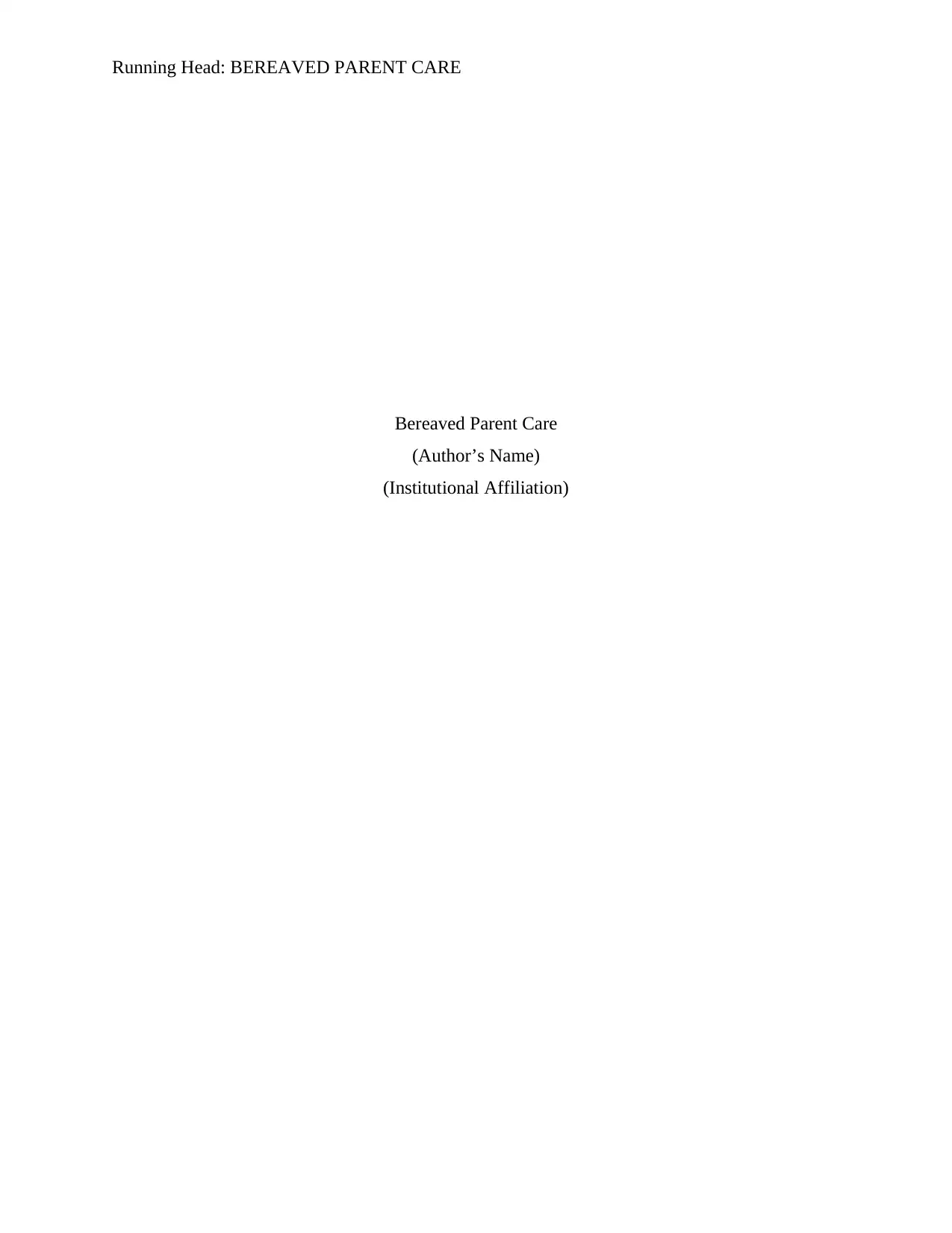
Running Head: BEREAVED PARENT CARE
Bereaved Parent Care
(Author’s Name)
(Institutional Affiliation)
Bereaved Parent Care
(Author’s Name)
(Institutional Affiliation)
Paraphrase This Document
Need a fresh take? Get an instant paraphrase of this document with our AI Paraphraser
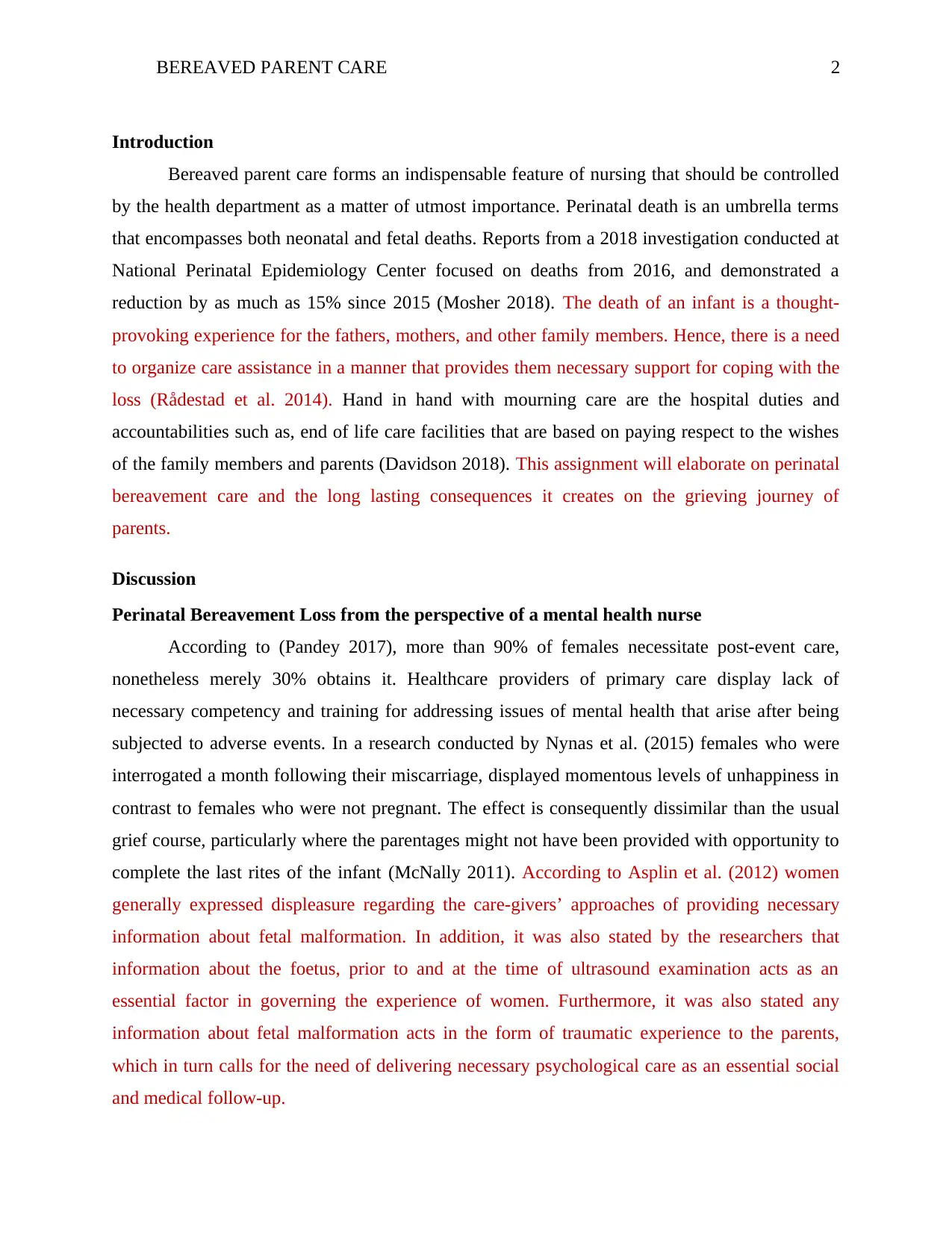
BEREAVED PARENT CARE 2
Introduction
Bereaved parent care forms an indispensable feature of nursing that should be controlled
by the health department as a matter of utmost importance. Perinatal death is an umbrella terms
that encompasses both neonatal and fetal deaths. Reports from a 2018 investigation conducted at
National Perinatal Epidemiology Center focused on deaths from 2016, and demonstrated a
reduction by as much as 15% since 2015 (Mosher 2018). The death of an infant is a thought-
provoking experience for the fathers, mothers, and other family members. Hence, there is a need
to organize care assistance in a manner that provides them necessary support for coping with the
loss (Rådestad et al. 2014). Hand in hand with mourning care are the hospital duties and
accountabilities such as, end of life care facilities that are based on paying respect to the wishes
of the family members and parents (Davidson 2018). This assignment will elaborate on perinatal
bereavement care and the long lasting consequences it creates on the grieving journey of
parents.
Discussion
Perinatal Bereavement Loss from the perspective of a mental health nurse
According to (Pandey 2017), more than 90% of females necessitate post-event care,
nonetheless merely 30% obtains it. Healthcare providers of primary care display lack of
necessary competency and training for addressing issues of mental health that arise after being
subjected to adverse events. In a research conducted by Nynas et al. (2015) females who were
interrogated a month following their miscarriage, displayed momentous levels of unhappiness in
contrast to females who were not pregnant. The effect is consequently dissimilar than the usual
grief course, particularly where the parentages might not have been provided with opportunity to
complete the last rites of the infant (McNally 2011). According to Asplin et al. (2012) women
generally expressed displeasure regarding the care-givers’ approaches of providing necessary
information about fetal malformation. In addition, it was also stated by the researchers that
information about the foetus, prior to and at the time of ultrasound examination acts as an
essential factor in governing the experience of women. Furthermore, it was also stated any
information about fetal malformation acts in the form of traumatic experience to the parents,
which in turn calls for the need of delivering necessary psychological care as an essential social
and medical follow-up.
Introduction
Bereaved parent care forms an indispensable feature of nursing that should be controlled
by the health department as a matter of utmost importance. Perinatal death is an umbrella terms
that encompasses both neonatal and fetal deaths. Reports from a 2018 investigation conducted at
National Perinatal Epidemiology Center focused on deaths from 2016, and demonstrated a
reduction by as much as 15% since 2015 (Mosher 2018). The death of an infant is a thought-
provoking experience for the fathers, mothers, and other family members. Hence, there is a need
to organize care assistance in a manner that provides them necessary support for coping with the
loss (Rådestad et al. 2014). Hand in hand with mourning care are the hospital duties and
accountabilities such as, end of life care facilities that are based on paying respect to the wishes
of the family members and parents (Davidson 2018). This assignment will elaborate on perinatal
bereavement care and the long lasting consequences it creates on the grieving journey of
parents.
Discussion
Perinatal Bereavement Loss from the perspective of a mental health nurse
According to (Pandey 2017), more than 90% of females necessitate post-event care,
nonetheless merely 30% obtains it. Healthcare providers of primary care display lack of
necessary competency and training for addressing issues of mental health that arise after being
subjected to adverse events. In a research conducted by Nynas et al. (2015) females who were
interrogated a month following their miscarriage, displayed momentous levels of unhappiness in
contrast to females who were not pregnant. The effect is consequently dissimilar than the usual
grief course, particularly where the parentages might not have been provided with opportunity to
complete the last rites of the infant (McNally 2011). According to Asplin et al. (2012) women
generally expressed displeasure regarding the care-givers’ approaches of providing necessary
information about fetal malformation. In addition, it was also stated by the researchers that
information about the foetus, prior to and at the time of ultrasound examination acts as an
essential factor in governing the experience of women. Furthermore, it was also stated any
information about fetal malformation acts in the form of traumatic experience to the parents,
which in turn calls for the need of delivering necessary psychological care as an essential social
and medical follow-up.
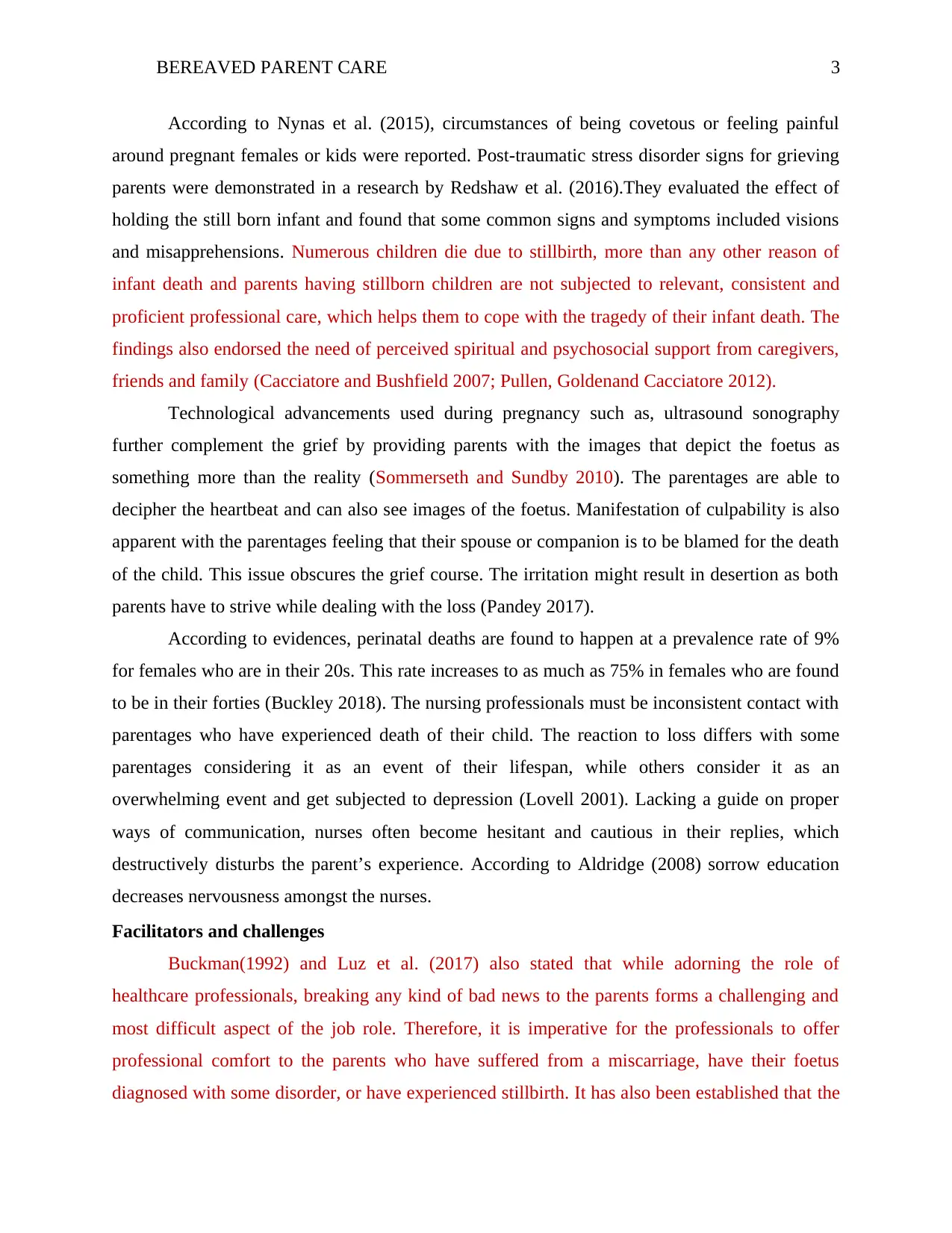
BEREAVED PARENT CARE 3
According to Nynas et al. (2015), circumstances of being covetous or feeling painful
around pregnant females or kids were reported. Post-traumatic stress disorder signs for grieving
parents were demonstrated in a research by Redshaw et al. (2016).They evaluated the effect of
holding the still born infant and found that some common signs and symptoms included visions
and misapprehensions. Numerous children die due to stillbirth, more than any other reason of
infant death and parents having stillborn children are not subjected to relevant, consistent and
proficient professional care, which helps them to cope with the tragedy of their infant death. The
findings also endorsed the need of perceived spiritual and psychosocial support from caregivers,
friends and family (Cacciatore and Bushfield 2007; Pullen, Goldenand Cacciatore 2012).
Technological advancements used during pregnancy such as, ultrasound sonography
further complement the grief by providing parents with the images that depict the foetus as
something more than the reality (Sommerseth and Sundby 2010). The parentages are able to
decipher the heartbeat and can also see images of the foetus. Manifestation of culpability is also
apparent with the parentages feeling that their spouse or companion is to be blamed for the death
of the child. This issue obscures the grief course. The irritation might result in desertion as both
parents have to strive while dealing with the loss (Pandey 2017).
According to evidences, perinatal deaths are found to happen at a prevalence rate of 9%
for females who are in their 20s. This rate increases to as much as 75% in females who are found
to be in their forties (Buckley 2018). The nursing professionals must be inconsistent contact with
parentages who have experienced death of their child. The reaction to loss differs with some
parentages considering it as an event of their lifespan, while others consider it as an
overwhelming event and get subjected to depression (Lovell 2001). Lacking a guide on proper
ways of communication, nurses often become hesitant and cautious in their replies, which
destructively disturbs the parent’s experience. According to Aldridge (2008) sorrow education
decreases nervousness amongst the nurses.
Facilitators and challenges
Buckman(1992) and Luz et al. (2017) also stated that while adorning the role of
healthcare professionals, breaking any kind of bad news to the parents forms a challenging and
most difficult aspect of the job role. Therefore, it is imperative for the professionals to offer
professional comfort to the parents who have suffered from a miscarriage, have their foetus
diagnosed with some disorder, or have experienced stillbirth. It has also been established that the
According to Nynas et al. (2015), circumstances of being covetous or feeling painful
around pregnant females or kids were reported. Post-traumatic stress disorder signs for grieving
parents were demonstrated in a research by Redshaw et al. (2016).They evaluated the effect of
holding the still born infant and found that some common signs and symptoms included visions
and misapprehensions. Numerous children die due to stillbirth, more than any other reason of
infant death and parents having stillborn children are not subjected to relevant, consistent and
proficient professional care, which helps them to cope with the tragedy of their infant death. The
findings also endorsed the need of perceived spiritual and psychosocial support from caregivers,
friends and family (Cacciatore and Bushfield 2007; Pullen, Goldenand Cacciatore 2012).
Technological advancements used during pregnancy such as, ultrasound sonography
further complement the grief by providing parents with the images that depict the foetus as
something more than the reality (Sommerseth and Sundby 2010). The parentages are able to
decipher the heartbeat and can also see images of the foetus. Manifestation of culpability is also
apparent with the parentages feeling that their spouse or companion is to be blamed for the death
of the child. This issue obscures the grief course. The irritation might result in desertion as both
parents have to strive while dealing with the loss (Pandey 2017).
According to evidences, perinatal deaths are found to happen at a prevalence rate of 9%
for females who are in their 20s. This rate increases to as much as 75% in females who are found
to be in their forties (Buckley 2018). The nursing professionals must be inconsistent contact with
parentages who have experienced death of their child. The reaction to loss differs with some
parentages considering it as an event of their lifespan, while others consider it as an
overwhelming event and get subjected to depression (Lovell 2001). Lacking a guide on proper
ways of communication, nurses often become hesitant and cautious in their replies, which
destructively disturbs the parent’s experience. According to Aldridge (2008) sorrow education
decreases nervousness amongst the nurses.
Facilitators and challenges
Buckman(1992) and Luz et al. (2017) also stated that while adorning the role of
healthcare professionals, breaking any kind of bad news to the parents forms a challenging and
most difficult aspect of the job role. Therefore, it is imperative for the professionals to offer
professional comfort to the parents who have suffered from a miscarriage, have their foetus
diagnosed with some disorder, or have experienced stillbirth. It has also been established that the
⊘ This is a preview!⊘
Do you want full access?
Subscribe today to unlock all pages.

Trusted by 1+ million students worldwide
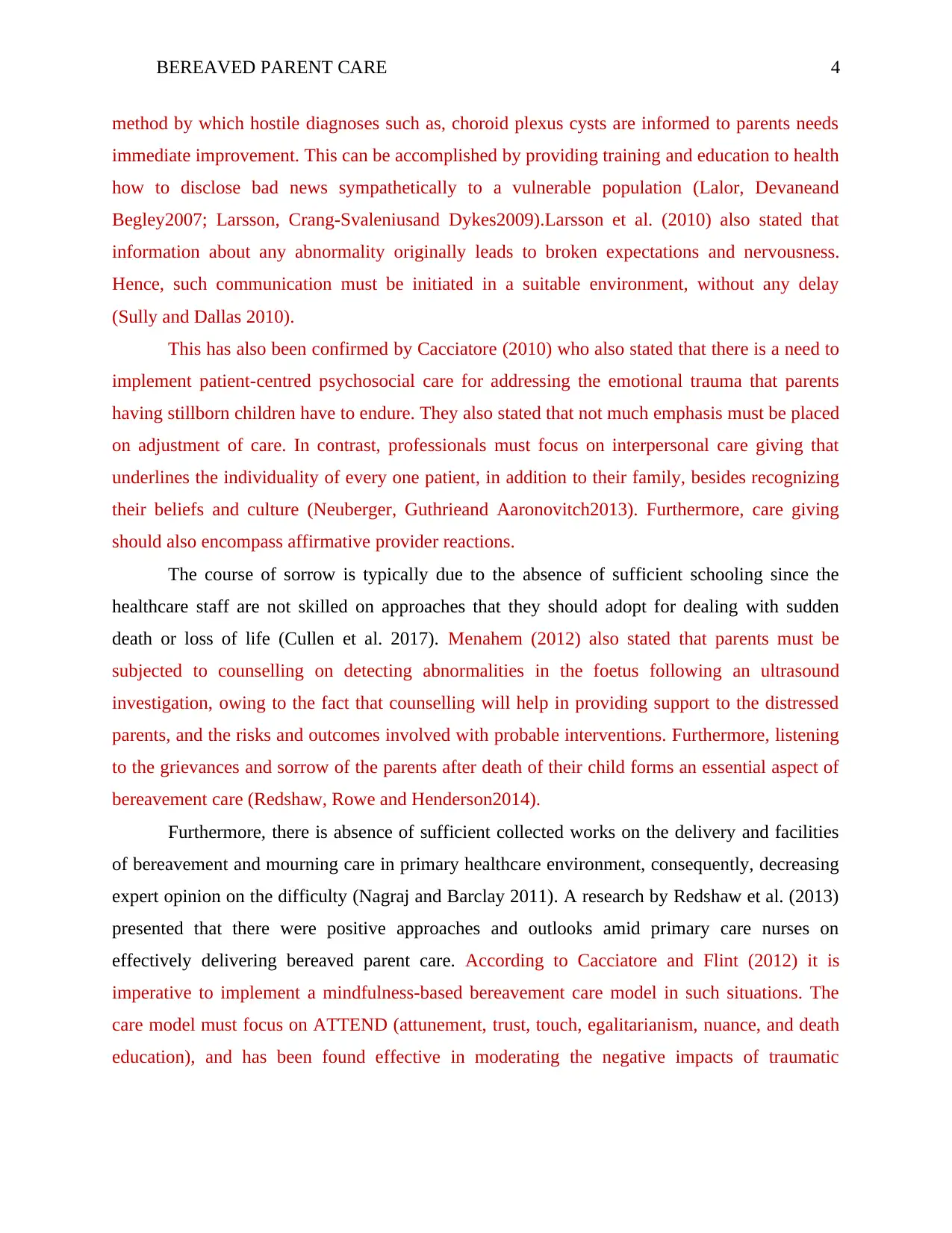
BEREAVED PARENT CARE 4
method by which hostile diagnoses such as, choroid plexus cysts are informed to parents needs
immediate improvement. This can be accomplished by providing training and education to health
how to disclose bad news sympathetically to a vulnerable population (Lalor, Devaneand
Begley2007; Larsson, Crang-Svaleniusand Dykes2009).Larsson et al. (2010) also stated that
information about any abnormality originally leads to broken expectations and nervousness.
Hence, such communication must be initiated in a suitable environment, without any delay
(Sully and Dallas 2010).
This has also been confirmed by Cacciatore (2010) who also stated that there is a need to
implement patient-centred psychosocial care for addressing the emotional trauma that parents
having stillborn children have to endure. They also stated that not much emphasis must be placed
on adjustment of care. In contrast, professionals must focus on interpersonal care giving that
underlines the individuality of every one patient, in addition to their family, besides recognizing
their beliefs and culture (Neuberger, Guthrieand Aaronovitch2013). Furthermore, care giving
should also encompass affirmative provider reactions.
The course of sorrow is typically due to the absence of sufficient schooling since the
healthcare staff are not skilled on approaches that they should adopt for dealing with sudden
death or loss of life (Cullen et al. 2017). Menahem (2012) also stated that parents must be
subjected to counselling on detecting abnormalities in the foetus following an ultrasound
investigation, owing to the fact that counselling will help in providing support to the distressed
parents, and the risks and outcomes involved with probable interventions. Furthermore, listening
to the grievances and sorrow of the parents after death of their child forms an essential aspect of
bereavement care (Redshaw, Rowe and Henderson2014).
Furthermore, there is absence of sufficient collected works on the delivery and facilities
of bereavement and mourning care in primary healthcare environment, consequently, decreasing
expert opinion on the difficulty (Nagraj and Barclay 2011). A research by Redshaw et al. (2013)
presented that there were positive approaches and outlooks amid primary care nurses on
effectively delivering bereaved parent care. According to Cacciatore and Flint (2012) it is
imperative to implement a mindfulness-based bereavement care model in such situations. The
care model must focus on ATTEND (attunement, trust, touch, egalitarianism, nuance, and death
education), and has been found effective in moderating the negative impacts of traumatic
method by which hostile diagnoses such as, choroid plexus cysts are informed to parents needs
immediate improvement. This can be accomplished by providing training and education to health
how to disclose bad news sympathetically to a vulnerable population (Lalor, Devaneand
Begley2007; Larsson, Crang-Svaleniusand Dykes2009).Larsson et al. (2010) also stated that
information about any abnormality originally leads to broken expectations and nervousness.
Hence, such communication must be initiated in a suitable environment, without any delay
(Sully and Dallas 2010).
This has also been confirmed by Cacciatore (2010) who also stated that there is a need to
implement patient-centred psychosocial care for addressing the emotional trauma that parents
having stillborn children have to endure. They also stated that not much emphasis must be placed
on adjustment of care. In contrast, professionals must focus on interpersonal care giving that
underlines the individuality of every one patient, in addition to their family, besides recognizing
their beliefs and culture (Neuberger, Guthrieand Aaronovitch2013). Furthermore, care giving
should also encompass affirmative provider reactions.
The course of sorrow is typically due to the absence of sufficient schooling since the
healthcare staff are not skilled on approaches that they should adopt for dealing with sudden
death or loss of life (Cullen et al. 2017). Menahem (2012) also stated that parents must be
subjected to counselling on detecting abnormalities in the foetus following an ultrasound
investigation, owing to the fact that counselling will help in providing support to the distressed
parents, and the risks and outcomes involved with probable interventions. Furthermore, listening
to the grievances and sorrow of the parents after death of their child forms an essential aspect of
bereavement care (Redshaw, Rowe and Henderson2014).
Furthermore, there is absence of sufficient collected works on the delivery and facilities
of bereavement and mourning care in primary healthcare environment, consequently, decreasing
expert opinion on the difficulty (Nagraj and Barclay 2011). A research by Redshaw et al. (2013)
presented that there were positive approaches and outlooks amid primary care nurses on
effectively delivering bereaved parent care. According to Cacciatore and Flint (2012) it is
imperative to implement a mindfulness-based bereavement care model in such situations. The
care model must focus on ATTEND (attunement, trust, touch, egalitarianism, nuance, and death
education), and has been found effective in moderating the negative impacts of traumatic
Paraphrase This Document
Need a fresh take? Get an instant paraphrase of this document with our AI Paraphraser
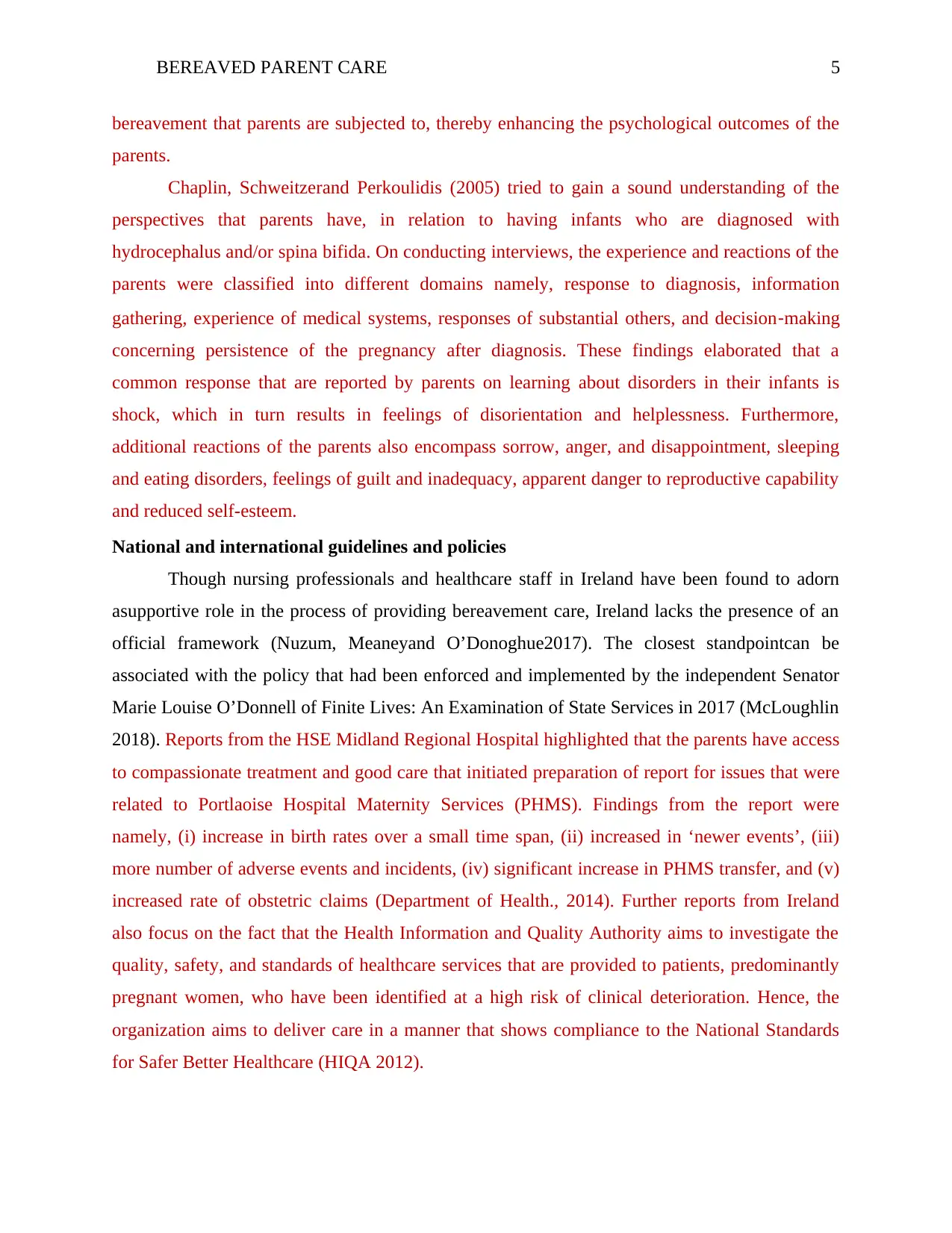
BEREAVED PARENT CARE 5
bereavement that parents are subjected to, thereby enhancing the psychological outcomes of the
parents.
Chaplin, Schweitzerand Perkoulidis (2005) tried to gain a sound understanding of the
perspectives that parents have, in relation to having infants who are diagnosed with
hydrocephalus and/or spina bifida. On conducting interviews, the experience and reactions of the
parents were classified into different domains namely, response to diagnosis, information
gathering, experience of medical systems, responses of substantial others, and decision‐making
concerning persistence of the pregnancy after diagnosis. These findings elaborated that a
common response that are reported by parents on learning about disorders in their infants is
shock, which in turn results in feelings of disorientation and helplessness. Furthermore,
additional reactions of the parents also encompass sorrow, anger, and disappointment, sleeping
and eating disorders, feelings of guilt and inadequacy, apparent danger to reproductive capability
and reduced self-esteem.
National and international guidelines and policies
Though nursing professionals and healthcare staff in Ireland have been found to adorn
asupportive role in the process of providing bereavement care, Ireland lacks the presence of an
official framework (Nuzum, Meaneyand O’Donoghue2017). The closest standpointcan be
associated with the policy that had been enforced and implemented by the independent Senator
Marie Louise O’Donnell of Finite Lives: An Examination of State Services in 2017 (McLoughlin
2018). Reports from the HSE Midland Regional Hospital highlighted that the parents have access
to compassionate treatment and good care that initiated preparation of report for issues that were
related to Portlaoise Hospital Maternity Services (PHMS). Findings from the report were
namely, (i) increase in birth rates over a small time span, (ii) increased in ‘newer events’, (iii)
more number of adverse events and incidents, (iv) significant increase in PHMS transfer, and (v)
increased rate of obstetric claims (Department of Health., 2014). Further reports from Ireland
also focus on the fact that the Health Information and Quality Authority aims to investigate the
quality, safety, and standards of healthcare services that are provided to patients, predominantly
pregnant women, who have been identified at a high risk of clinical deterioration. Hence, the
organization aims to deliver care in a manner that shows compliance to the National Standards
for Safer Better Healthcare (HIQA 2012).
bereavement that parents are subjected to, thereby enhancing the psychological outcomes of the
parents.
Chaplin, Schweitzerand Perkoulidis (2005) tried to gain a sound understanding of the
perspectives that parents have, in relation to having infants who are diagnosed with
hydrocephalus and/or spina bifida. On conducting interviews, the experience and reactions of the
parents were classified into different domains namely, response to diagnosis, information
gathering, experience of medical systems, responses of substantial others, and decision‐making
concerning persistence of the pregnancy after diagnosis. These findings elaborated that a
common response that are reported by parents on learning about disorders in their infants is
shock, which in turn results in feelings of disorientation and helplessness. Furthermore,
additional reactions of the parents also encompass sorrow, anger, and disappointment, sleeping
and eating disorders, feelings of guilt and inadequacy, apparent danger to reproductive capability
and reduced self-esteem.
National and international guidelines and policies
Though nursing professionals and healthcare staff in Ireland have been found to adorn
asupportive role in the process of providing bereavement care, Ireland lacks the presence of an
official framework (Nuzum, Meaneyand O’Donoghue2017). The closest standpointcan be
associated with the policy that had been enforced and implemented by the independent Senator
Marie Louise O’Donnell of Finite Lives: An Examination of State Services in 2017 (McLoughlin
2018). Reports from the HSE Midland Regional Hospital highlighted that the parents have access
to compassionate treatment and good care that initiated preparation of report for issues that were
related to Portlaoise Hospital Maternity Services (PHMS). Findings from the report were
namely, (i) increase in birth rates over a small time span, (ii) increased in ‘newer events’, (iii)
more number of adverse events and incidents, (iv) significant increase in PHMS transfer, and (v)
increased rate of obstetric claims (Department of Health., 2014). Further reports from Ireland
also focus on the fact that the Health Information and Quality Authority aims to investigate the
quality, safety, and standards of healthcare services that are provided to patients, predominantly
pregnant women, who have been identified at a high risk of clinical deterioration. Hence, the
organization aims to deliver care in a manner that shows compliance to the National Standards
for Safer Better Healthcare (HIQA 2012).
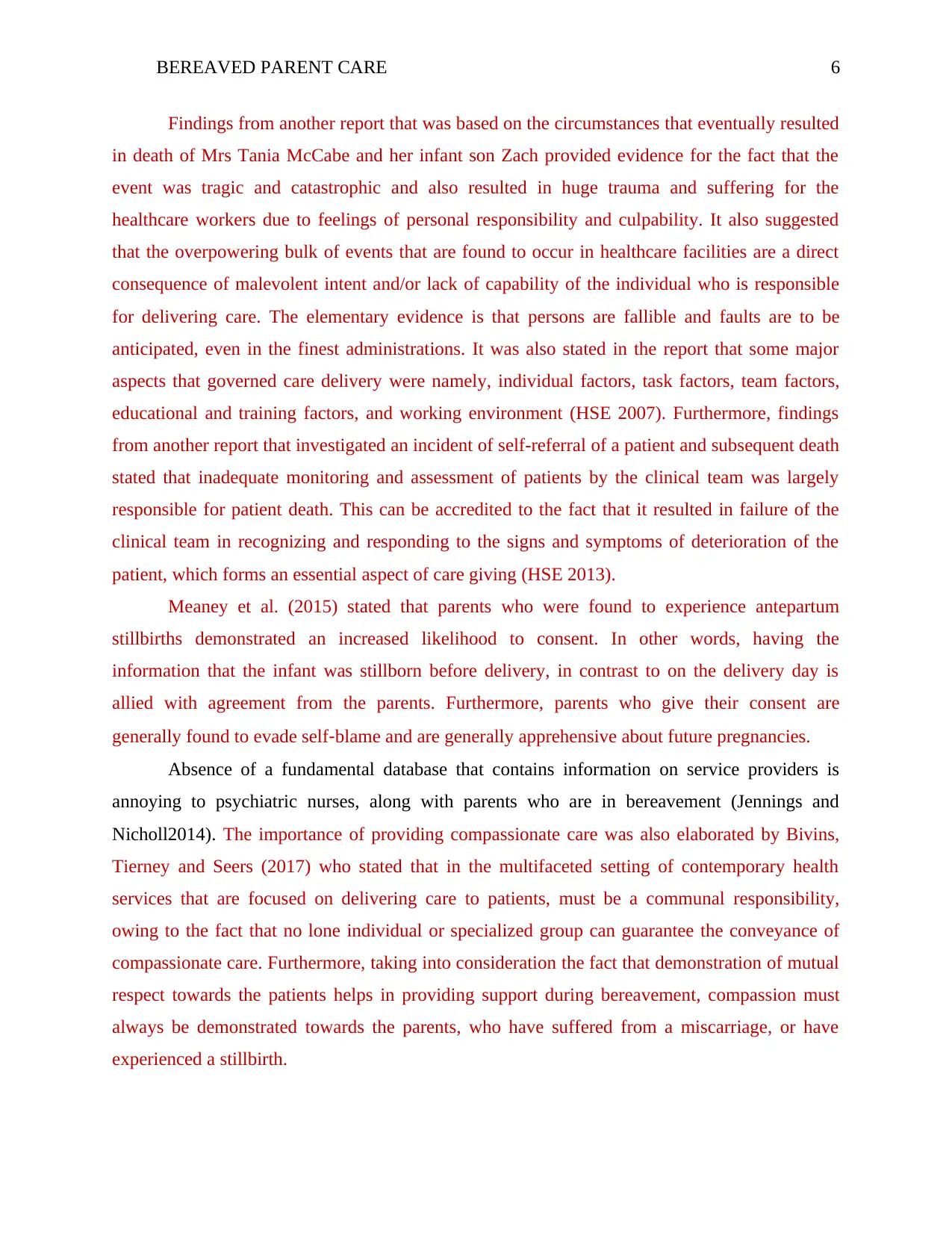
BEREAVED PARENT CARE 6
Findings from another report that was based on the circumstances that eventually resulted
in death of Mrs Tania McCabe and her infant son Zach provided evidence for the fact that the
event was tragic and catastrophic and also resulted in huge trauma and suffering for the
healthcare workers due to feelings of personal responsibility and culpability. It also suggested
that the overpowering bulk of events that are found to occur in healthcare facilities are a direct
consequence of malevolent intent and/or lack of capability of the individual who is responsible
for delivering care. The elementary evidence is that persons are fallible and faults are to be
anticipated, even in the finest administrations. It was also stated in the report that some major
aspects that governed care delivery were namely, individual factors, task factors, team factors,
educational and training factors, and working environment (HSE 2007). Furthermore, findings
from another report that investigated an incident of self-referral of a patient and subsequent death
stated that inadequate monitoring and assessment of patients by the clinical team was largely
responsible for patient death. This can be accredited to the fact that it resulted in failure of the
clinical team in recognizing and responding to the signs and symptoms of deterioration of the
patient, which forms an essential aspect of care giving (HSE 2013).
Meaney et al. (2015) stated that parents who were found to experience antepartum
stillbirths demonstrated an increased likelihood to consent. In other words, having the
information that the infant was stillborn before delivery, in contrast to on the delivery day is
allied with agreement from the parents. Furthermore, parents who give their consent are
generally found to evade self‐blame and are generally apprehensive about future pregnancies.
Absence of a fundamental database that contains information on service providers is
annoying to psychiatric nurses, along with parents who are in bereavement (Jennings and
Nicholl2014). The importance of providing compassionate care was also elaborated by Bivins,
Tierney and Seers (2017) who stated that in the multifaceted setting of contemporary health
services that are focused on delivering care to patients, must be a communal responsibility,
owing to the fact that no lone individual or specialized group can guarantee the conveyance of
compassionate care. Furthermore, taking into consideration the fact that demonstration of mutual
respect towards the patients helps in providing support during bereavement, compassion must
always be demonstrated towards the parents, who have suffered from a miscarriage, or have
experienced a stillbirth.
Findings from another report that was based on the circumstances that eventually resulted
in death of Mrs Tania McCabe and her infant son Zach provided evidence for the fact that the
event was tragic and catastrophic and also resulted in huge trauma and suffering for the
healthcare workers due to feelings of personal responsibility and culpability. It also suggested
that the overpowering bulk of events that are found to occur in healthcare facilities are a direct
consequence of malevolent intent and/or lack of capability of the individual who is responsible
for delivering care. The elementary evidence is that persons are fallible and faults are to be
anticipated, even in the finest administrations. It was also stated in the report that some major
aspects that governed care delivery were namely, individual factors, task factors, team factors,
educational and training factors, and working environment (HSE 2007). Furthermore, findings
from another report that investigated an incident of self-referral of a patient and subsequent death
stated that inadequate monitoring and assessment of patients by the clinical team was largely
responsible for patient death. This can be accredited to the fact that it resulted in failure of the
clinical team in recognizing and responding to the signs and symptoms of deterioration of the
patient, which forms an essential aspect of care giving (HSE 2013).
Meaney et al. (2015) stated that parents who were found to experience antepartum
stillbirths demonstrated an increased likelihood to consent. In other words, having the
information that the infant was stillborn before delivery, in contrast to on the delivery day is
allied with agreement from the parents. Furthermore, parents who give their consent are
generally found to evade self‐blame and are generally apprehensive about future pregnancies.
Absence of a fundamental database that contains information on service providers is
annoying to psychiatric nurses, along with parents who are in bereavement (Jennings and
Nicholl2014). The importance of providing compassionate care was also elaborated by Bivins,
Tierney and Seers (2017) who stated that in the multifaceted setting of contemporary health
services that are focused on delivering care to patients, must be a communal responsibility,
owing to the fact that no lone individual or specialized group can guarantee the conveyance of
compassionate care. Furthermore, taking into consideration the fact that demonstration of mutual
respect towards the patients helps in providing support during bereavement, compassion must
always be demonstrated towards the parents, who have suffered from a miscarriage, or have
experienced a stillbirth.
⊘ This is a preview!⊘
Do you want full access?
Subscribe today to unlock all pages.

Trusted by 1+ million students worldwide
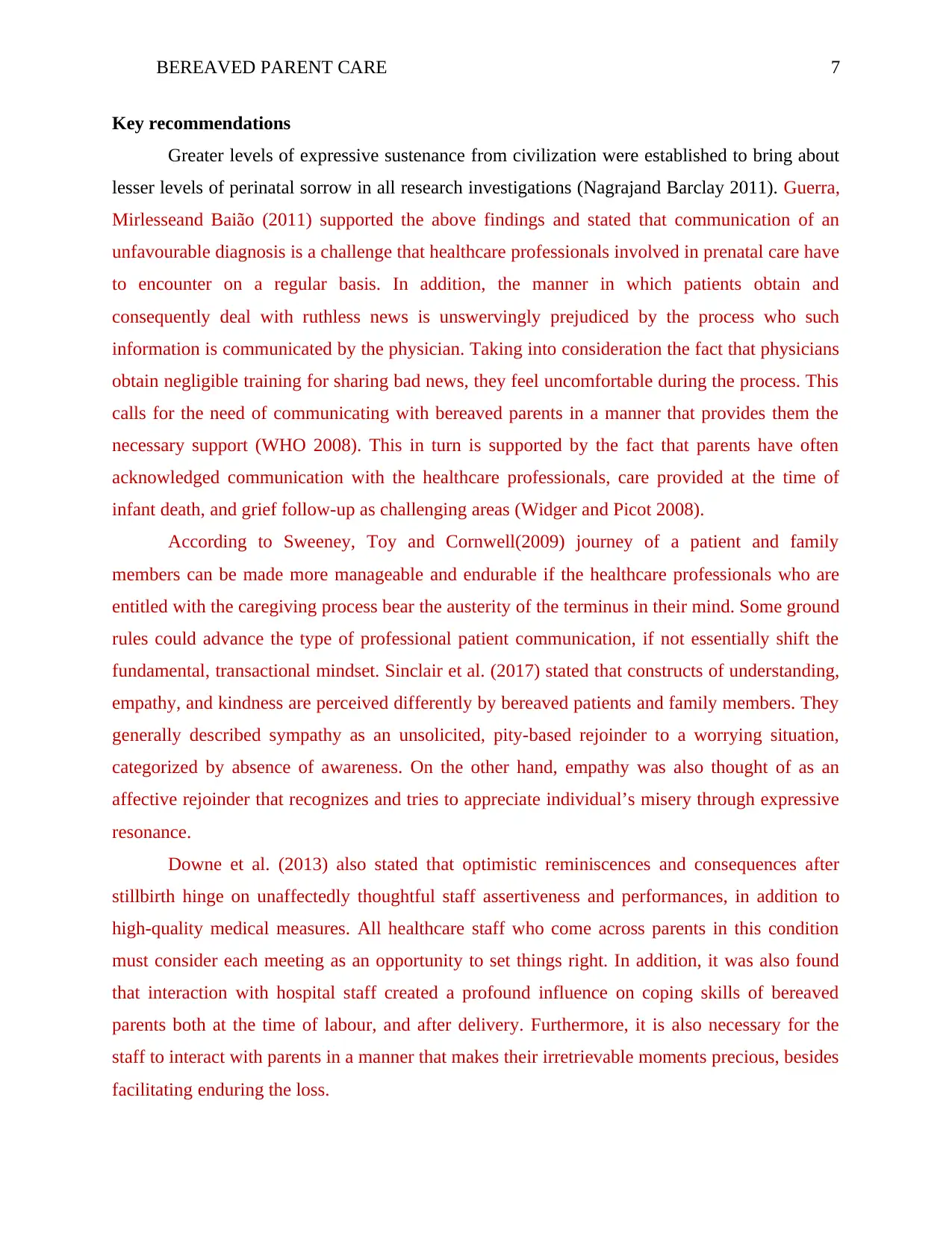
BEREAVED PARENT CARE 7
Key recommendations
Greater levels of expressive sustenance from civilization were established to bring about
lesser levels of perinatal sorrow in all research investigations (Nagrajand Barclay 2011). Guerra,
Mirlesseand Baião (2011) supported the above findings and stated that communication of an
unfavourable diagnosis is a challenge that healthcare professionals involved in prenatal care have
to encounter on a regular basis. In addition, the manner in which patients obtain and
consequently deal with ruthless news is unswervingly prejudiced by the process who such
information is communicated by the physician. Taking into consideration the fact that physicians
obtain negligible training for sharing bad news, they feel uncomfortable during the process. This
calls for the need of communicating with bereaved parents in a manner that provides them the
necessary support (WHO 2008). This in turn is supported by the fact that parents have often
acknowledged communication with the healthcare professionals, care provided at the time of
infant death, and grief follow-up as challenging areas (Widger and Picot 2008).
According to Sweeney, Toy and Cornwell(2009) journey of a patient and family
members can be made more manageable and endurable if the healthcare professionals who are
entitled with the caregiving process bear the austerity of the terminus in their mind. Some ground
rules could advance the type of professional patient communication, if not essentially shift the
fundamental, transactional mindset. Sinclair et al. (2017) stated that constructs of understanding,
empathy, and kindness are perceived differently by bereaved patients and family members. They
generally described sympathy as an unsolicited, pity-based rejoinder to a worrying situation,
categorized by absence of awareness. On the other hand, empathy was also thought of as an
affective rejoinder that recognizes and tries to appreciate individual’s misery through expressive
resonance.
Downe et al. (2013) also stated that optimistic reminiscences and consequences after
stillbirth hinge on unaffectedly thoughtful staff assertiveness and performances, in addition to
high-quality medical measures. All healthcare staff who come across parents in this condition
must consider each meeting as an opportunity to set things right. In addition, it was also found
that interaction with hospital staff created a profound influence on coping skills of bereaved
parents both at the time of labour, and after delivery. Furthermore, it is also necessary for the
staff to interact with parents in a manner that makes their irretrievable moments precious, besides
facilitating enduring the loss.
Key recommendations
Greater levels of expressive sustenance from civilization were established to bring about
lesser levels of perinatal sorrow in all research investigations (Nagrajand Barclay 2011). Guerra,
Mirlesseand Baião (2011) supported the above findings and stated that communication of an
unfavourable diagnosis is a challenge that healthcare professionals involved in prenatal care have
to encounter on a regular basis. In addition, the manner in which patients obtain and
consequently deal with ruthless news is unswervingly prejudiced by the process who such
information is communicated by the physician. Taking into consideration the fact that physicians
obtain negligible training for sharing bad news, they feel uncomfortable during the process. This
calls for the need of communicating with bereaved parents in a manner that provides them the
necessary support (WHO 2008). This in turn is supported by the fact that parents have often
acknowledged communication with the healthcare professionals, care provided at the time of
infant death, and grief follow-up as challenging areas (Widger and Picot 2008).
According to Sweeney, Toy and Cornwell(2009) journey of a patient and family
members can be made more manageable and endurable if the healthcare professionals who are
entitled with the caregiving process bear the austerity of the terminus in their mind. Some ground
rules could advance the type of professional patient communication, if not essentially shift the
fundamental, transactional mindset. Sinclair et al. (2017) stated that constructs of understanding,
empathy, and kindness are perceived differently by bereaved patients and family members. They
generally described sympathy as an unsolicited, pity-based rejoinder to a worrying situation,
categorized by absence of awareness. On the other hand, empathy was also thought of as an
affective rejoinder that recognizes and tries to appreciate individual’s misery through expressive
resonance.
Downe et al. (2013) also stated that optimistic reminiscences and consequences after
stillbirth hinge on unaffectedly thoughtful staff assertiveness and performances, in addition to
high-quality medical measures. All healthcare staff who come across parents in this condition
must consider each meeting as an opportunity to set things right. In addition, it was also found
that interaction with hospital staff created a profound influence on coping skills of bereaved
parents both at the time of labour, and after delivery. Furthermore, it is also necessary for the
staff to interact with parents in a manner that makes their irretrievable moments precious, besides
facilitating enduring the loss.
Paraphrase This Document
Need a fresh take? Get an instant paraphrase of this document with our AI Paraphraser
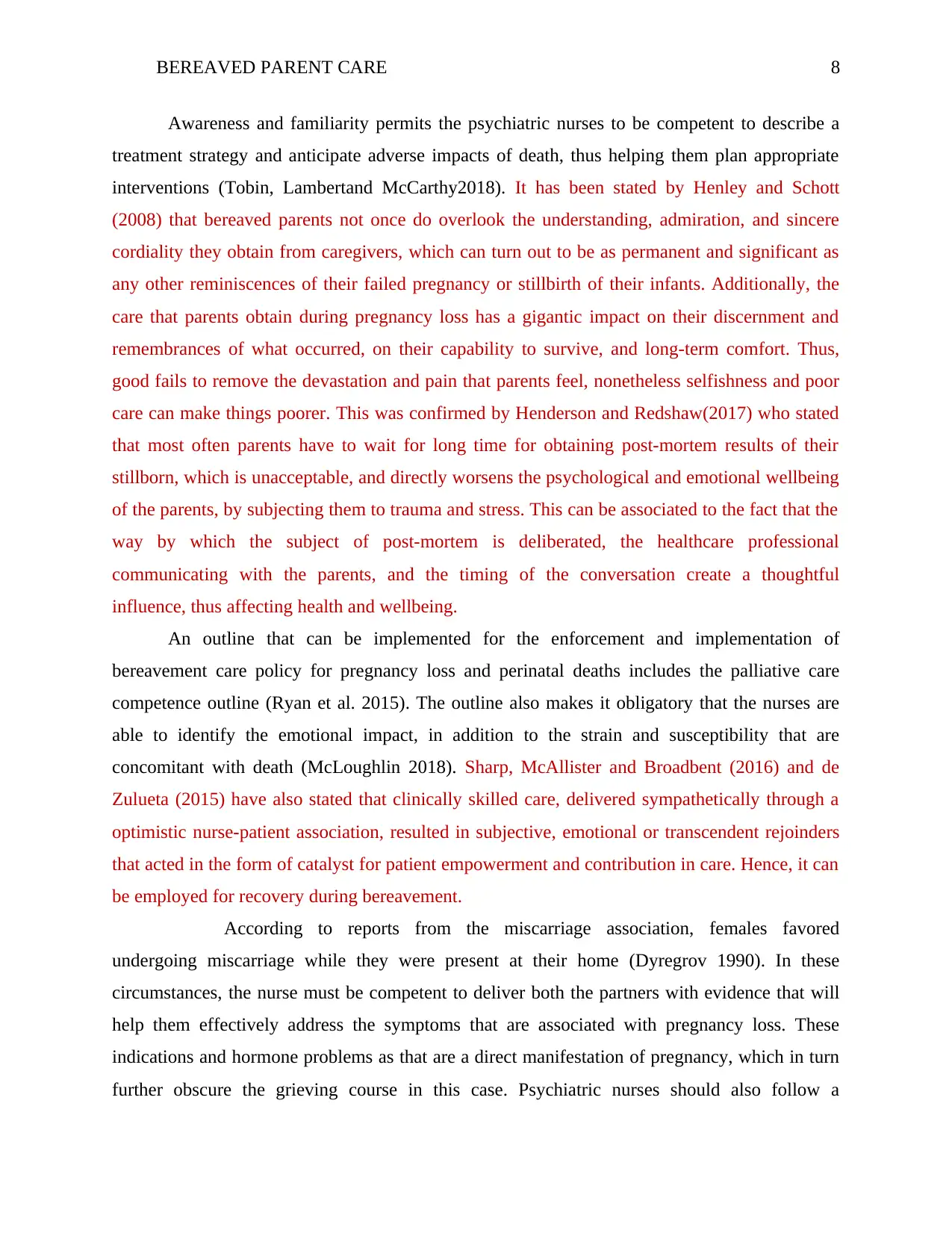
BEREAVED PARENT CARE 8
Awareness and familiarity permits the psychiatric nurses to be competent to describe a
treatment strategy and anticipate adverse impacts of death, thus helping them plan appropriate
interventions (Tobin, Lambertand McCarthy2018). It has been stated by Henley and Schott
(2008) that bereaved parents not once do overlook the understanding, admiration, and sincere
cordiality they obtain from caregivers, which can turn out to be as permanent and significant as
any other reminiscences of their failed pregnancy or stillbirth of their infants. Additionally, the
care that parents obtain during pregnancy loss has a gigantic impact on their discernment and
remembrances of what occurred, on their capability to survive, and long-term comfort. Thus,
good fails to remove the devastation and pain that parents feel, nonetheless selfishness and poor
care can make things poorer. This was confirmed by Henderson and Redshaw(2017) who stated
that most often parents have to wait for long time for obtaining post-mortem results of their
stillborn, which is unacceptable, and directly worsens the psychological and emotional wellbeing
of the parents, by subjecting them to trauma and stress. This can be associated to the fact that the
way by which the subject of post-mortem is deliberated, the healthcare professional
communicating with the parents, and the timing of the conversation create a thoughtful
influence, thus affecting health and wellbeing.
An outline that can be implemented for the enforcement and implementation of
bereavement care policy for pregnancy loss and perinatal deaths includes the palliative care
competence outline (Ryan et al. 2015). The outline also makes it obligatory that the nurses are
able to identify the emotional impact, in addition to the strain and susceptibility that are
concomitant with death (McLoughlin 2018). Sharp, McAllister and Broadbent (2016) and de
Zulueta (2015) have also stated that clinically skilled care, delivered sympathetically through a
optimistic nurse-patient association, resulted in subjective, emotional or transcendent rejoinders
that acted in the form of catalyst for patient empowerment and contribution in care. Hence, it can
be employed for recovery during bereavement.
According to reports from the miscarriage association, females favored
undergoing miscarriage while they were present at their home (Dyregrov 1990). In these
circumstances, the nurse must be competent to deliver both the partners with evidence that will
help them effectively address the symptoms that are associated with pregnancy loss. These
indications and hormone problems as that are a direct manifestation of pregnancy, which in turn
further obscure the grieving course in this case. Psychiatric nurses should also follow a
Awareness and familiarity permits the psychiatric nurses to be competent to describe a
treatment strategy and anticipate adverse impacts of death, thus helping them plan appropriate
interventions (Tobin, Lambertand McCarthy2018). It has been stated by Henley and Schott
(2008) that bereaved parents not once do overlook the understanding, admiration, and sincere
cordiality they obtain from caregivers, which can turn out to be as permanent and significant as
any other reminiscences of their failed pregnancy or stillbirth of their infants. Additionally, the
care that parents obtain during pregnancy loss has a gigantic impact on their discernment and
remembrances of what occurred, on their capability to survive, and long-term comfort. Thus,
good fails to remove the devastation and pain that parents feel, nonetheless selfishness and poor
care can make things poorer. This was confirmed by Henderson and Redshaw(2017) who stated
that most often parents have to wait for long time for obtaining post-mortem results of their
stillborn, which is unacceptable, and directly worsens the psychological and emotional wellbeing
of the parents, by subjecting them to trauma and stress. This can be associated to the fact that the
way by which the subject of post-mortem is deliberated, the healthcare professional
communicating with the parents, and the timing of the conversation create a thoughtful
influence, thus affecting health and wellbeing.
An outline that can be implemented for the enforcement and implementation of
bereavement care policy for pregnancy loss and perinatal deaths includes the palliative care
competence outline (Ryan et al. 2015). The outline also makes it obligatory that the nurses are
able to identify the emotional impact, in addition to the strain and susceptibility that are
concomitant with death (McLoughlin 2018). Sharp, McAllister and Broadbent (2016) and de
Zulueta (2015) have also stated that clinically skilled care, delivered sympathetically through a
optimistic nurse-patient association, resulted in subjective, emotional or transcendent rejoinders
that acted in the form of catalyst for patient empowerment and contribution in care. Hence, it can
be employed for recovery during bereavement.
According to reports from the miscarriage association, females favored
undergoing miscarriage while they were present at their home (Dyregrov 1990). In these
circumstances, the nurse must be competent to deliver both the partners with evidence that will
help them effectively address the symptoms that are associated with pregnancy loss. These
indications and hormone problems as that are a direct manifestation of pregnancy, which in turn
further obscure the grieving course in this case. Psychiatric nurses should also follow a
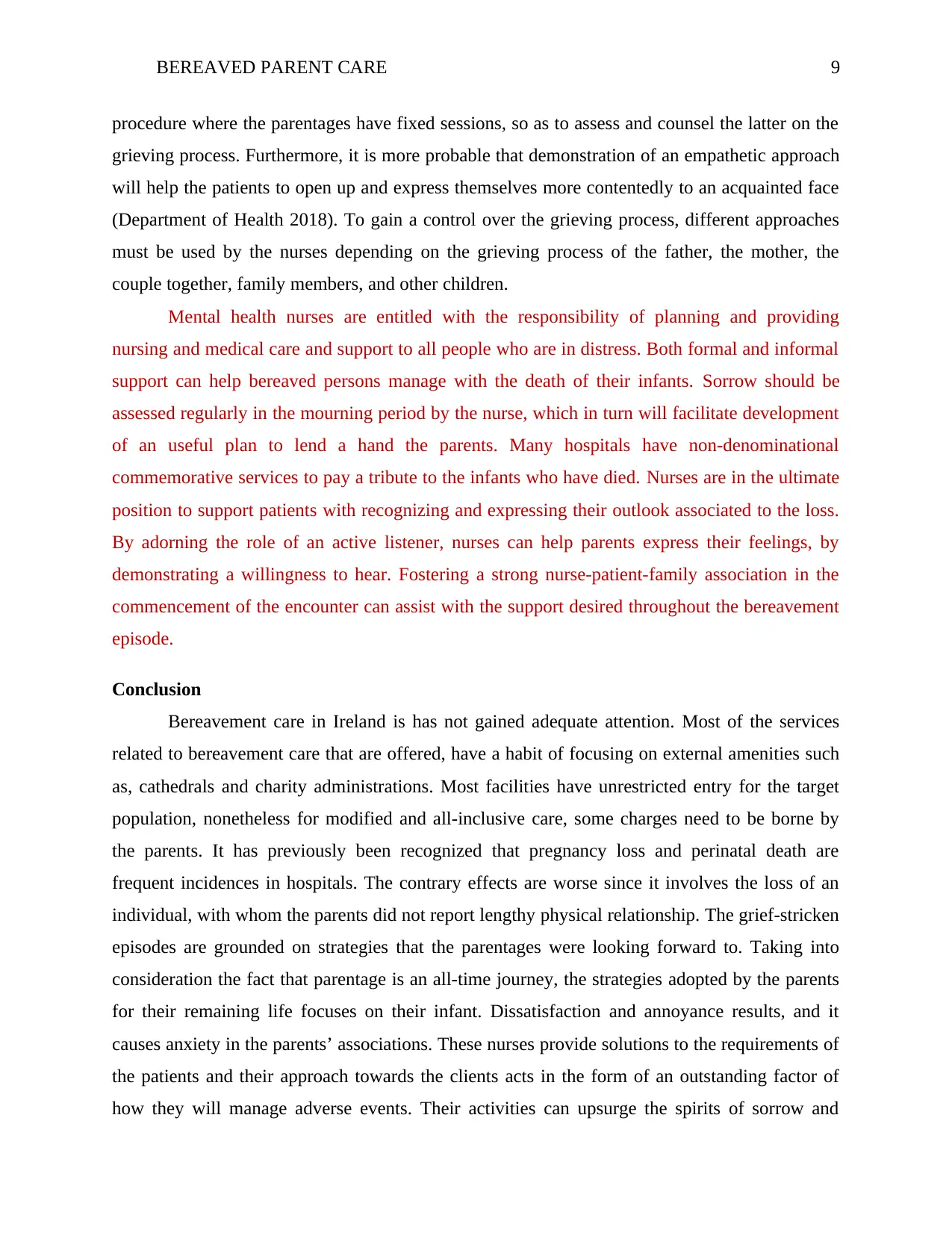
BEREAVED PARENT CARE 9
procedure where the parentages have fixed sessions, so as to assess and counsel the latter on the
grieving process. Furthermore, it is more probable that demonstration of an empathetic approach
will help the patients to open up and express themselves more contentedly to an acquainted face
(Department of Health 2018). To gain a control over the grieving process, different approaches
must be used by the nurses depending on the grieving process of the father, the mother, the
couple together, family members, and other children.
Mental health nurses are entitled with the responsibility of planning and providing
nursing and medical care and support to all people who are in distress. Both formal and informal
support can help bereaved persons manage with the death of their infants. Sorrow should be
assessed regularly in the mourning period by the nurse, which in turn will facilitate development
of an useful plan to lend a hand the parents. Many hospitals have non-denominational
commemorative services to pay a tribute to the infants who have died. Nurses are in the ultimate
position to support patients with recognizing and expressing their outlook associated to the loss.
By adorning the role of an active listener, nurses can help parents express their feelings, by
demonstrating a willingness to hear. Fostering a strong nurse-patient-family association in the
commencement of the encounter can assist with the support desired throughout the bereavement
episode.
Conclusion
Bereavement care in Ireland is has not gained adequate attention. Most of the services
related to bereavement care that are offered, have a habit of focusing on external amenities such
as, cathedrals and charity administrations. Most facilities have unrestricted entry for the target
population, nonetheless for modified and all-inclusive care, some charges need to be borne by
the parents. It has previously been recognized that pregnancy loss and perinatal death are
frequent incidences in hospitals. The contrary effects are worse since it involves the loss of an
individual, with whom the parents did not report lengthy physical relationship. The grief-stricken
episodes are grounded on strategies that the parentages were looking forward to. Taking into
consideration the fact that parentage is an all-time journey, the strategies adopted by the parents
for their remaining life focuses on their infant. Dissatisfaction and annoyance results, and it
causes anxiety in the parents’ associations. These nurses provide solutions to the requirements of
the patients and their approach towards the clients acts in the form of an outstanding factor of
how they will manage adverse events. Their activities can upsurge the spirits of sorrow and
procedure where the parentages have fixed sessions, so as to assess and counsel the latter on the
grieving process. Furthermore, it is more probable that demonstration of an empathetic approach
will help the patients to open up and express themselves more contentedly to an acquainted face
(Department of Health 2018). To gain a control over the grieving process, different approaches
must be used by the nurses depending on the grieving process of the father, the mother, the
couple together, family members, and other children.
Mental health nurses are entitled with the responsibility of planning and providing
nursing and medical care and support to all people who are in distress. Both formal and informal
support can help bereaved persons manage with the death of their infants. Sorrow should be
assessed regularly in the mourning period by the nurse, which in turn will facilitate development
of an useful plan to lend a hand the parents. Many hospitals have non-denominational
commemorative services to pay a tribute to the infants who have died. Nurses are in the ultimate
position to support patients with recognizing and expressing their outlook associated to the loss.
By adorning the role of an active listener, nurses can help parents express their feelings, by
demonstrating a willingness to hear. Fostering a strong nurse-patient-family association in the
commencement of the encounter can assist with the support desired throughout the bereavement
episode.
Conclusion
Bereavement care in Ireland is has not gained adequate attention. Most of the services
related to bereavement care that are offered, have a habit of focusing on external amenities such
as, cathedrals and charity administrations. Most facilities have unrestricted entry for the target
population, nonetheless for modified and all-inclusive care, some charges need to be borne by
the parents. It has previously been recognized that pregnancy loss and perinatal death are
frequent incidences in hospitals. The contrary effects are worse since it involves the loss of an
individual, with whom the parents did not report lengthy physical relationship. The grief-stricken
episodes are grounded on strategies that the parentages were looking forward to. Taking into
consideration the fact that parentage is an all-time journey, the strategies adopted by the parents
for their remaining life focuses on their infant. Dissatisfaction and annoyance results, and it
causes anxiety in the parents’ associations. These nurses provide solutions to the requirements of
the patients and their approach towards the clients acts in the form of an outstanding factor of
how they will manage adverse events. Their activities can upsurge the spirits of sorrow and
⊘ This is a preview!⊘
Do you want full access?
Subscribe today to unlock all pages.

Trusted by 1+ million students worldwide
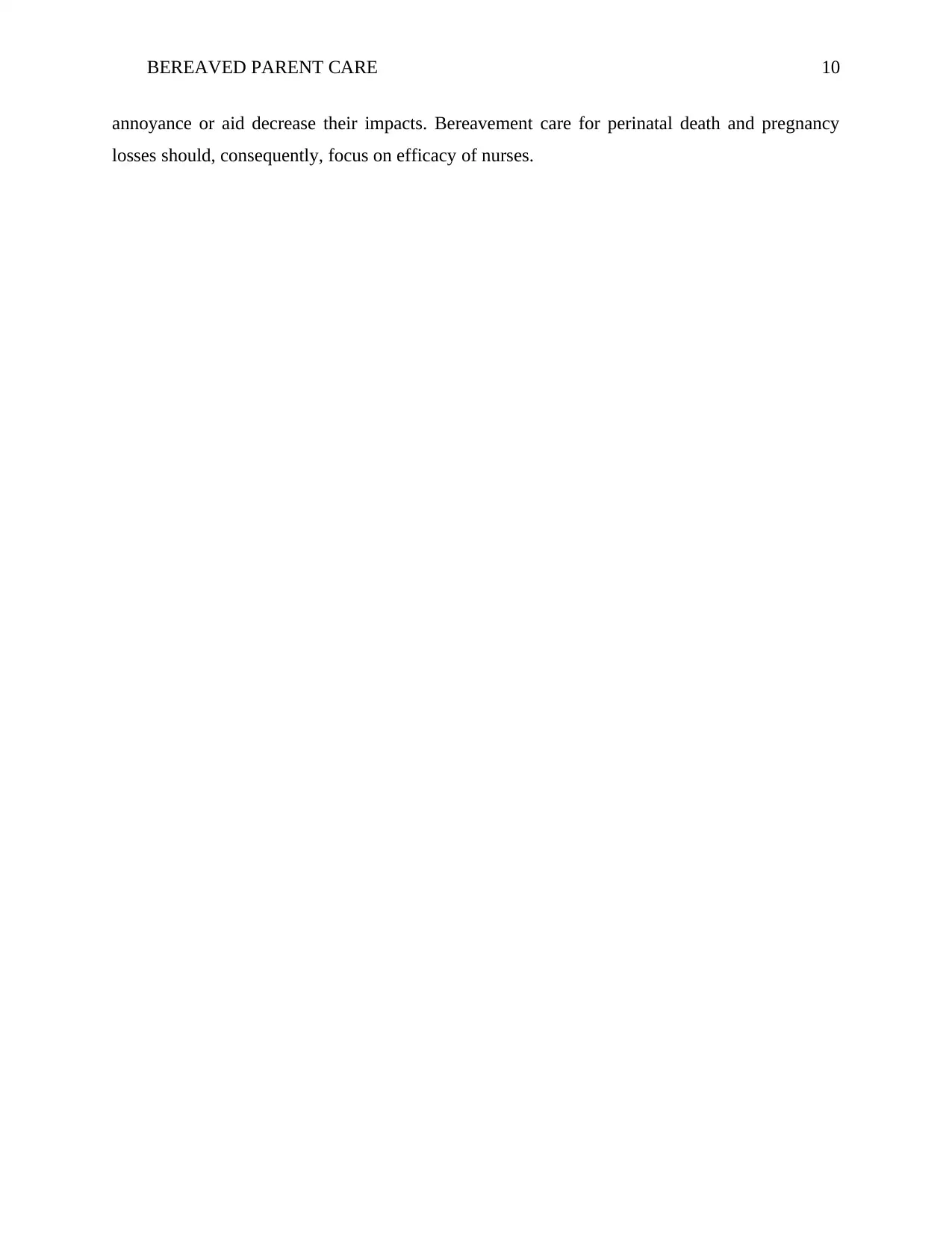
BEREAVED PARENT CARE 10
annoyance or aid decrease their impacts. Bereavement care for perinatal death and pregnancy
losses should, consequently, focus on efficacy of nurses.
annoyance or aid decrease their impacts. Bereavement care for perinatal death and pregnancy
losses should, consequently, focus on efficacy of nurses.
Paraphrase This Document
Need a fresh take? Get an instant paraphrase of this document with our AI Paraphraser
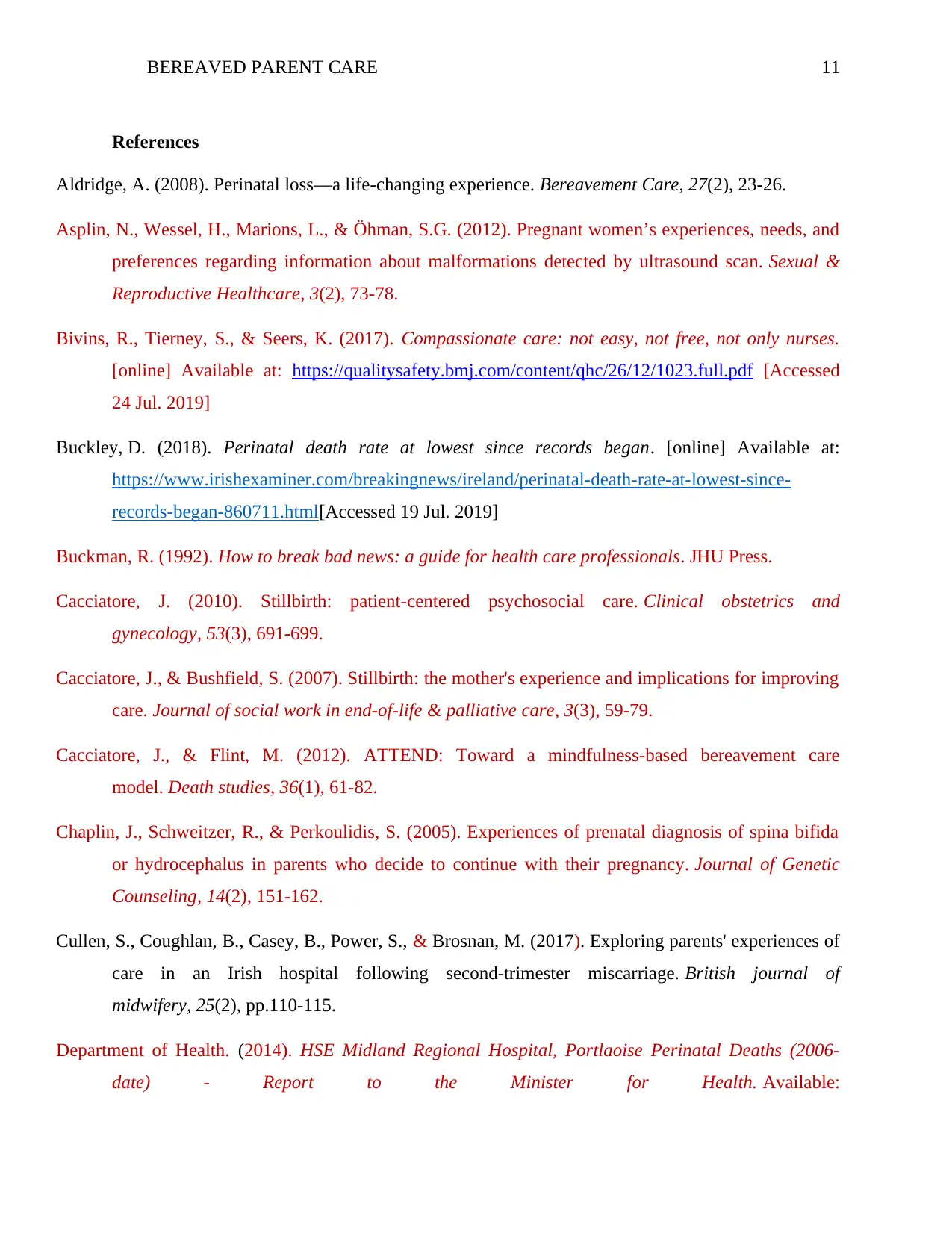
BEREAVED PARENT CARE 11
References
Aldridge, A. (2008). Perinatal loss—a life-changing experience. Bereavement Care, 27(2), 23-26.
Asplin, N., Wessel, H., Marions, L., & Öhman, S.G. (2012). Pregnant women’s experiences, needs, and
preferences regarding information about malformations detected by ultrasound scan. Sexual &
Reproductive Healthcare, 3(2), 73-78.
Bivins, R., Tierney, S., & Seers, K. (2017). Compassionate care: not easy, not free, not only nurses.
[online] Available at: https://qualitysafety.bmj.com/content/qhc/26/12/1023.full.pdf [Accessed
24 Jul. 2019]
Buckley, D. (2018). Perinatal death rate at lowest since records began. [online] Available at:
https://www.irishexaminer.com/breakingnews/ireland/perinatal-death-rate-at-lowest-since-
records-began-860711.html[Accessed 19 Jul. 2019]
Buckman, R. (1992). How to break bad news: a guide for health care professionals. JHU Press.
Cacciatore, J. (2010). Stillbirth: patient-centered psychosocial care. Clinical obstetrics and
gynecology, 53(3), 691-699.
Cacciatore, J., & Bushfield, S. (2007). Stillbirth: the mother's experience and implications for improving
care. Journal of social work in end-of-life & palliative care, 3(3), 59-79.
Cacciatore, J., & Flint, M. (2012). ATTEND: Toward a mindfulness-based bereavement care
model. Death studies, 36(1), 61-82.
Chaplin, J., Schweitzer, R., & Perkoulidis, S. (2005). Experiences of prenatal diagnosis of spina bifida
or hydrocephalus in parents who decide to continue with their pregnancy. Journal of Genetic
Counseling, 14(2), 151-162.
Cullen, S., Coughlan, B., Casey, B., Power, S., & Brosnan, M. (2017). Exploring parents' experiences of
care in an Irish hospital following second-trimester miscarriage. British journal of
midwifery, 25(2), pp.110-115.
Department of Health. (2014). HSE Midland Regional Hospital, Portlaoise Perinatal Deaths (2006-
date) - Report to the Minister for Health. Available:
References
Aldridge, A. (2008). Perinatal loss—a life-changing experience. Bereavement Care, 27(2), 23-26.
Asplin, N., Wessel, H., Marions, L., & Öhman, S.G. (2012). Pregnant women’s experiences, needs, and
preferences regarding information about malformations detected by ultrasound scan. Sexual &
Reproductive Healthcare, 3(2), 73-78.
Bivins, R., Tierney, S., & Seers, K. (2017). Compassionate care: not easy, not free, not only nurses.
[online] Available at: https://qualitysafety.bmj.com/content/qhc/26/12/1023.full.pdf [Accessed
24 Jul. 2019]
Buckley, D. (2018). Perinatal death rate at lowest since records began. [online] Available at:
https://www.irishexaminer.com/breakingnews/ireland/perinatal-death-rate-at-lowest-since-
records-began-860711.html[Accessed 19 Jul. 2019]
Buckman, R. (1992). How to break bad news: a guide for health care professionals. JHU Press.
Cacciatore, J. (2010). Stillbirth: patient-centered psychosocial care. Clinical obstetrics and
gynecology, 53(3), 691-699.
Cacciatore, J., & Bushfield, S. (2007). Stillbirth: the mother's experience and implications for improving
care. Journal of social work in end-of-life & palliative care, 3(3), 59-79.
Cacciatore, J., & Flint, M. (2012). ATTEND: Toward a mindfulness-based bereavement care
model. Death studies, 36(1), 61-82.
Chaplin, J., Schweitzer, R., & Perkoulidis, S. (2005). Experiences of prenatal diagnosis of spina bifida
or hydrocephalus in parents who decide to continue with their pregnancy. Journal of Genetic
Counseling, 14(2), 151-162.
Cullen, S., Coughlan, B., Casey, B., Power, S., & Brosnan, M. (2017). Exploring parents' experiences of
care in an Irish hospital following second-trimester miscarriage. British journal of
midwifery, 25(2), pp.110-115.
Department of Health. (2014). HSE Midland Regional Hospital, Portlaoise Perinatal Deaths (2006-
date) - Report to the Minister for Health. Available:
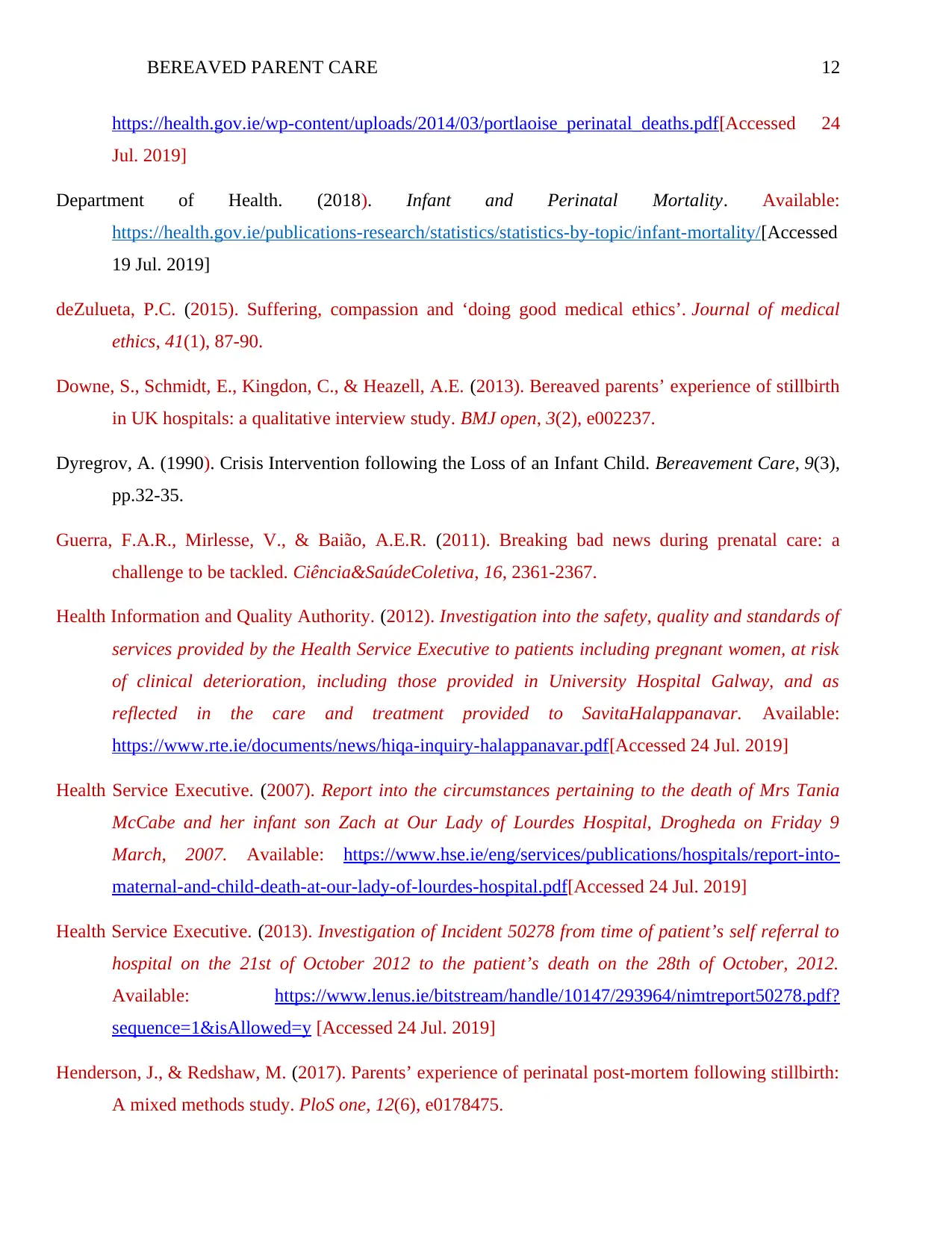
BEREAVED PARENT CARE 12
https://health.gov.ie/wp-content/uploads/2014/03/portlaoise_perinatal_deaths.pdf[Accessed 24
Jul. 2019]
Department of Health. (2018). Infant and Perinatal Mortality. Available:
https://health.gov.ie/publications-research/statistics/statistics-by-topic/infant-mortality/[Accessed
19 Jul. 2019]
deZulueta, P.C. (2015). Suffering, compassion and ‘doing good medical ethics’. Journal of medical
ethics, 41(1), 87-90.
Downe, S., Schmidt, E., Kingdon, C., & Heazell, A.E. (2013). Bereaved parents’ experience of stillbirth
in UK hospitals: a qualitative interview study. BMJ open, 3(2), e002237.
Dyregrov, A. (1990). Crisis Intervention following the Loss of an Infant Child. Bereavement Care, 9(3),
pp.32-35.
Guerra, F.A.R., Mirlesse, V., & Baião, A.E.R. (2011). Breaking bad news during prenatal care: a
challenge to be tackled. Ciência&SaúdeColetiva, 16, 2361-2367.
Health Information and Quality Authority. (2012). Investigation into the safety, quality and standards of
services provided by the Health Service Executive to patients including pregnant women, at risk
of clinical deterioration, including those provided in University Hospital Galway, and as
reflected in the care and treatment provided to SavitaHalappanavar. Available:
https://www.rte.ie/documents/news/hiqa-inquiry-halappanavar.pdf[Accessed 24 Jul. 2019]
Health Service Executive. (2007). Report into the circumstances pertaining to the death of Mrs Tania
McCabe and her infant son Zach at Our Lady of Lourdes Hospital, Drogheda on Friday 9
March, 2007. Available: https://www.hse.ie/eng/services/publications/hospitals/report-into-
maternal-and-child-death-at-our-lady-of-lourdes-hospital.pdf[Accessed 24 Jul. 2019]
Health Service Executive. (2013). Investigation of Incident 50278 from time of patient’s self referral to
hospital on the 21st of October 2012 to the patient’s death on the 28th of October, 2012.
Available: https://www.lenus.ie/bitstream/handle/10147/293964/nimtreport50278.pdf?
sequence=1&isAllowed=y [Accessed 24 Jul. 2019]
Henderson, J., & Redshaw, M. (2017). Parents’ experience of perinatal post-mortem following stillbirth:
A mixed methods study. PloS one, 12(6), e0178475.
https://health.gov.ie/wp-content/uploads/2014/03/portlaoise_perinatal_deaths.pdf[Accessed 24
Jul. 2019]
Department of Health. (2018). Infant and Perinatal Mortality. Available:
https://health.gov.ie/publications-research/statistics/statistics-by-topic/infant-mortality/[Accessed
19 Jul. 2019]
deZulueta, P.C. (2015). Suffering, compassion and ‘doing good medical ethics’. Journal of medical
ethics, 41(1), 87-90.
Downe, S., Schmidt, E., Kingdon, C., & Heazell, A.E. (2013). Bereaved parents’ experience of stillbirth
in UK hospitals: a qualitative interview study. BMJ open, 3(2), e002237.
Dyregrov, A. (1990). Crisis Intervention following the Loss of an Infant Child. Bereavement Care, 9(3),
pp.32-35.
Guerra, F.A.R., Mirlesse, V., & Baião, A.E.R. (2011). Breaking bad news during prenatal care: a
challenge to be tackled. Ciência&SaúdeColetiva, 16, 2361-2367.
Health Information and Quality Authority. (2012). Investigation into the safety, quality and standards of
services provided by the Health Service Executive to patients including pregnant women, at risk
of clinical deterioration, including those provided in University Hospital Galway, and as
reflected in the care and treatment provided to SavitaHalappanavar. Available:
https://www.rte.ie/documents/news/hiqa-inquiry-halappanavar.pdf[Accessed 24 Jul. 2019]
Health Service Executive. (2007). Report into the circumstances pertaining to the death of Mrs Tania
McCabe and her infant son Zach at Our Lady of Lourdes Hospital, Drogheda on Friday 9
March, 2007. Available: https://www.hse.ie/eng/services/publications/hospitals/report-into-
maternal-and-child-death-at-our-lady-of-lourdes-hospital.pdf[Accessed 24 Jul. 2019]
Health Service Executive. (2013). Investigation of Incident 50278 from time of patient’s self referral to
hospital on the 21st of October 2012 to the patient’s death on the 28th of October, 2012.
Available: https://www.lenus.ie/bitstream/handle/10147/293964/nimtreport50278.pdf?
sequence=1&isAllowed=y [Accessed 24 Jul. 2019]
Henderson, J., & Redshaw, M. (2017). Parents’ experience of perinatal post-mortem following stillbirth:
A mixed methods study. PloS one, 12(6), e0178475.
⊘ This is a preview!⊘
Do you want full access?
Subscribe today to unlock all pages.

Trusted by 1+ million students worldwide
1 out of 15
Related Documents
Your All-in-One AI-Powered Toolkit for Academic Success.
+13062052269
info@desklib.com
Available 24*7 on WhatsApp / Email
![[object Object]](/_next/static/media/star-bottom.7253800d.svg)
Unlock your academic potential
Copyright © 2020–2026 A2Z Services. All Rights Reserved. Developed and managed by ZUCOL.





